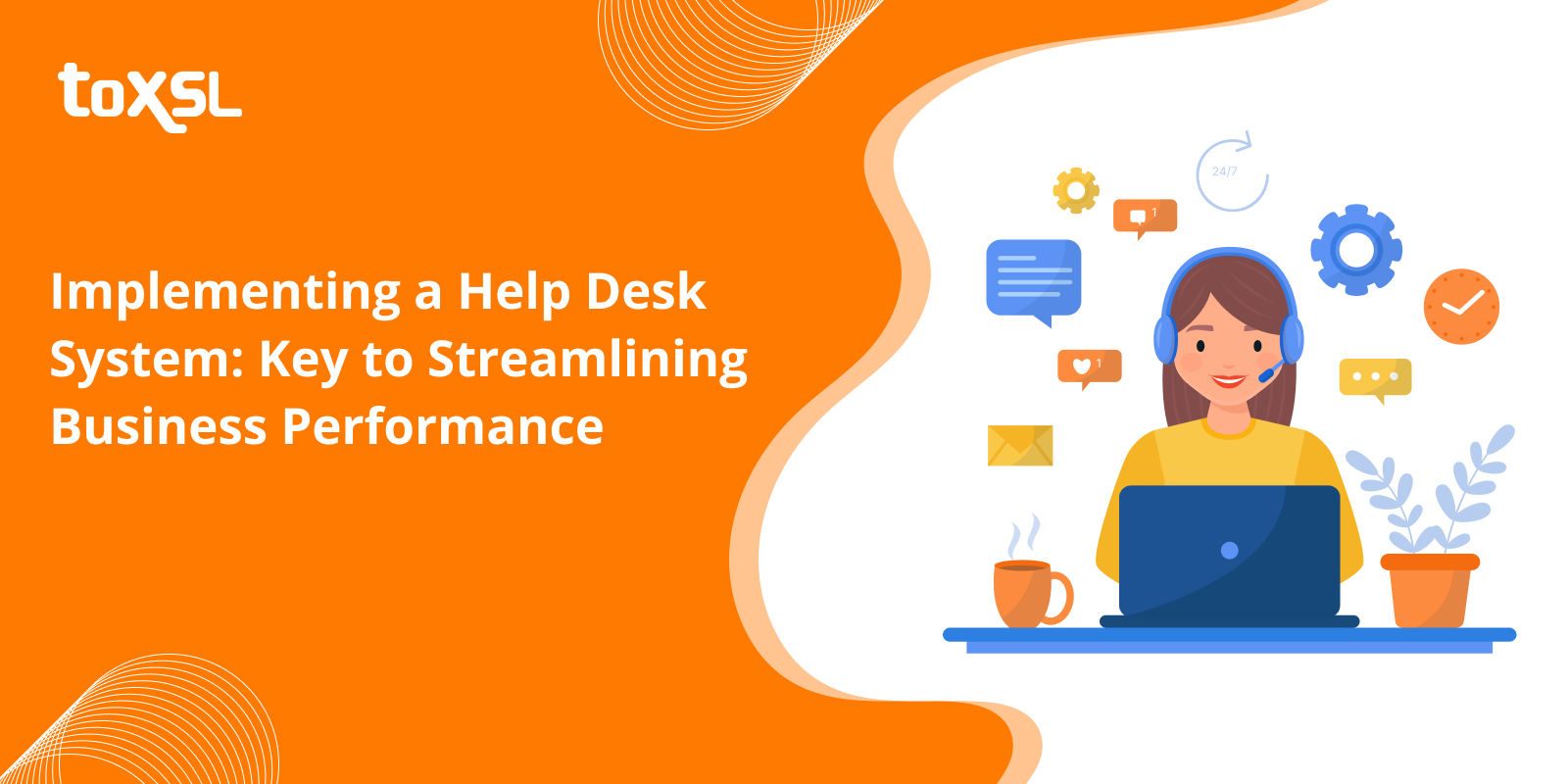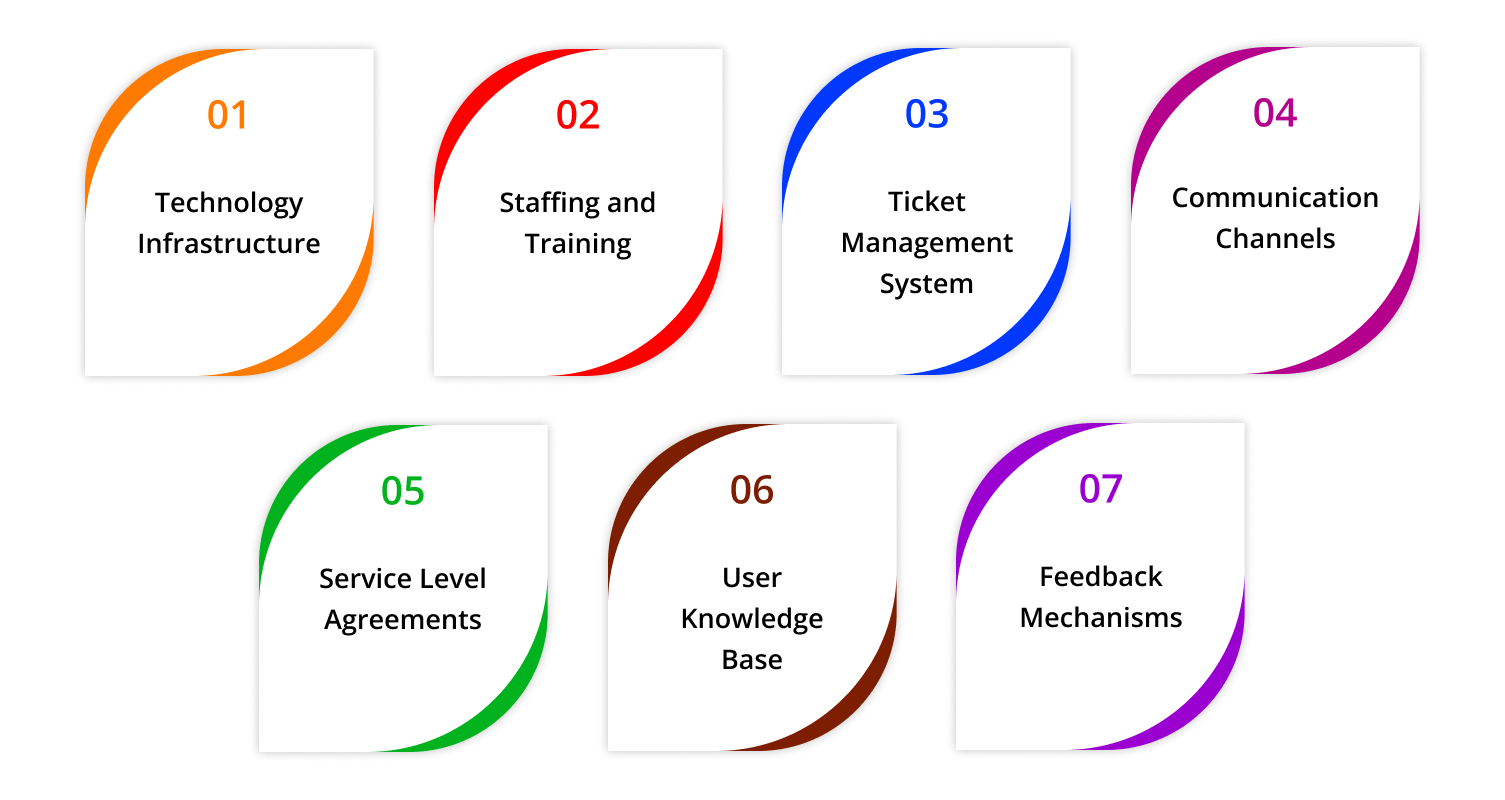- Aug 06, 2025
- Others
- 3135
Share this post on:

Are you looking to enhance your business performance? Implementing help desk software can boost your business’s performance and propel it to the next level. Continue reading the blog and discover how IT Help Desk software can help you boost your business globally.
Help desk software plays a crucial role in offering high-quality customer service. Companies aiming to offer prompt and effective customer assistance heavily depend on help desk systems, which facilitate communication, automate processes, and leverage technology over human intervention. Help desk tools not only offer data analysis and reporting capabilities but also facilitate businesses in monitoring progress and pinpointing areas that need enhancements. Let us now plunge into the depths of the article and learn how IT Help Desk software can help in the exponential growth of your business.
According to research, the global IT help desk software market size is projected to reach $11.4 billion by 2025, with a CAGR of 9.0% during the forecast period. Another survey says that 44% of organizations use IT helpdesk software to manage their internal IT support operations.
The Importance of an Efficient IT Help Desk
An efficient IT help desk software is crucial for the smooth operation of any organization’s IT infrastructure. It serves as the frontline support for all technology-related issues and plays a vital role in ensuring that employees can work productively without disruptions. The importance of an efficient IT help desk can be understood through various key points:
1. Productivity & Customer Satisfaction: One of the primary reasons why an efficient IT help desk is essential is its impact on productivity. When employees encounter technical issues, having a responsive and effective help desk can quickly resolve these issues, allowing employees to resume their work promptly. Not that, if an organization provides external customer support, an efficient IT help desk is crucial for maintaining high levels of customer satisfaction. By promptly addressing customer queries and technical issues, the help desk contributes to a positive customer experience.
2. Cost Savings and Security: An efficient IT help desk can also result in cost savings for organizations. By resolving issues in a timely manner, the help desk prevents prolonged downtime that could lead to financial losses. Additionally, a well-managed help desk can identify recurring problems and address underlying issues, reducing overall IT support costs in the long run. With that, IT help desks are often responsible for handling security incidents and ensuring that data breaches are promptly addressed. An efficient help desk can quickly respond to security threats, implement necessary security measures, and educate employees on best practices, thereby enhancing the organization’s overall cybersecurity posture.
3. IT Infrastructure Optimization: A well-functioning IT help desk plays a crucial role in optimizing an organization’s IT infrastructure. By monitoring and analyzing support requests, the help desk can identify areas for improvement, recommend system upgrades or enhancements, and contribute to the overall efficiency of the IT environment.
Factors Affecting IT Help Desk
The IT help desk plays a crucial role in organizations by providing technical support to employees and customers. Several factors can impact the efficiency and effectiveness of an IT help desk, influencing its overall performance and customer satisfaction levels. Understanding these factors is essential for organizations to optimize their IT support services and ensure smooth operations.

1. Technology Infrastructure
The technology infrastructure of an organization significantly affects the IT help desk operations. A robust and up-to-date infrastructure with the latest hardware, software, and networking capabilities can enhance the help desk’s ability to resolve issues promptly. Conversely, outdated or inadequate technology can lead to delays, inefficiencies, and increased downtime, impacting user experience and productivity.
2. Staffing and Training
The quality of the help desk staff and their training are critical factors in determining the effectiveness of IT support services. Adequately trained and skilled personnel can efficiently troubleshoot problems, provide timely solutions, and offer excellent customer service. Insufficient staffing levels or lack of training can result in longer resolution times, decreased customer satisfaction, and higher employee turnover rates.
3. Ticket Management System
An efficient management system is essential for organizing and prioritizing incoming support requests. A well-implemented system helps streamline workflows, track issue resolution progress, allocate resources effectively and ensure that no request falls through the cracks. Without a robust ticketing system in place, help desk agents may struggle to manage their workload efficiently, leading to delays and customer dissatisfaction.
4. Communication Channels
The availability of multiple communication channels such as phone support, email, live chat, self-service portals, or mobile apps can impact how users interact with the IT help desk. If calls are involved, using a Telzio auto attendant system can efficiently route callers to the right department or resource without delay. Offering diverse communication options allows users to choose their preferred method of seeking assistance, enhancing accessibility and convenience. However, managing multiple channels effectively requires proper integration, coordination, and monitoring to deliver consistent support experiences across all platforms.
5. Service Level Agreements (SLAs)
Service Level Agreements define the expected response times, resolution targets, and service quality standards that the IT help desk must adhere to. SLAs play a vital role in setting clear expectations for both customers and support staff, ensuring accountability and transparency in service delivery. Failure to meet SLA requirements can lead to penalties, reputational damage, and loss of trust from stakeholders.
6. User Knowledge Base
A comprehensive user knowledge base containing FAQs, troubleshooting guides, tutorials, and self-help resources can empower users to resolve common issues independently without escalating them to the help desk. A well-maintained knowledge base not only reduces the volume of support requests but also enhances user satisfaction by providing quick solutions and promoting self-reliance.
7. Feedback Mechanisms
Regular feedback from users regarding their experiences with the IT help desk is crucial for identifying areas of improvement and addressing recurring issues proactively. Implementing surveys, feedback forms, or follow-up calls allows organizations to gather valuable insights into customer satisfaction levels, service quality perceptions, and areas needing attention or enhancement.
Challenges in IT Help Desk
In the fast-paced and technology-driven world we live in today, IT help desks play a crucial role in providing technical support to users within organizations. However, running an efficient IT help desk comes with its own set of challenges that can impact the overall productivity and effectiveness of the support provided. In this article, we will delve into some of the key challenges faced by IT help desks and explore potential solutions to address them.

1. High Volume of Support Requests
One of the primary challenges faced by IT help desks is the high volume of support requests they receive on a daily basis. Users from various departments within an organization reach out to the help desk for assistance with technical issues, ranging from simple password resets to complex software malfunctions. Managing this influx of requests can be overwhelming for help desk staff, leading to delays in response times and potential backlogs.
2. Diverse Range of Technical Issues
Another challenge in IT help desk operations is the diverse range of technical issues that support staff must be equipped to handle. From hardware problems to software glitches, network connectivity issues, and cybersecurity threats, help desk agents need to possess a broad skill set and knowledge base to effectively troubleshoot and resolve these issues. Providing adequate training and resources to help desk staff is essential to ensure they can address a wide variety of technical problems efficiently.
3. Lack of Standardized Processes
In some organizations, a lack of standardized processes and procedures for handling support requests can pose a significant challenge for IT help desks. Without clear guidelines in place, there may be inconsistencies in how requests are triaged, prioritized, and resolved, leading to confusion among staff and potentially impacting the quality of support provided. Implementing standardized workflows and ticketing systems can help streamline help desk operations and improve overall efficiency.
4. Communication Barriers
Effective communication is key to successful IT support, but communication barriers can often hinder the resolution process. Language barriers, technical jargon, or miscommunication between support staff and end-users can lead to misunderstandings and delays in problem resolution. Help desk agents should be trained in effective communication techniques to ensure clear and concise interactions with users, ultimately enhancing the overall support experience.
5. Balancing Reactive vs. Proactive Support
IT help desks often find themselves caught between providing reactive support for immediate issues reported by users and proactive support to prevent future problems from arising. Balancing these two approaches is essential for maintaining a stable IT environment within an organization. While reactive support addresses urgent issues as they occur, proactive support involves monitoring systems, identifying potential issues before they escalate, and implementing preventive measures to minimize downtime.
Conclusion
In summary, a well-functioning IT support desk is essential for any business that depends on technology for its operations. Utilizing help desk software can greatly enhance business performance by offering a centralized platform for managing customer support requests. It enables businesses to streamline ticket creation, allocate tickets to the appropriate support agents, monitor ticket progress, and deliver timely resolutions to customer concerns. Help desk tool like jiDesk aids in optimizing support procedures, decreasing response times, mitigating customer dissatisfaction, and enhancing customer retention rates. It is a solution powered by artificial intelligence that offers exceptional customer support and task management. Its AI features aid in efficient task organization and workflow management. Additionally, it offers comprehensive analytics and reporting capabilities, empowering businesses to pinpoint recurring issues, monitor resolution times, and evaluate customer input.
Looking for develop IT Help Desk Software like jiDesk? Look no further than our software development company. Contact us to learn more about IT Help Desk software development and how we can help you maximize your business’s performance.
FAQs
1. What is a help desk system?
A help desk system is a software solution that manages customer support inquiries, streamlining issue resolution, ticket management, and communication. It enhances efficiency by centralizing support requests and automating workflows, ensuring timely and accurate responses to customers.
2. How does a help desk system improve business performance?
A help desk system enhances business performance by reducing response times, improving customer satisfaction, and optimizing support team productivity. It offers real-time insights, automates repetitive tasks, and allows businesses to focus on strategic goals, driving growth.
3. What features should a help desk system have?
Key features include ticket management, knowledge base integration, automated workflows, multi-channel support (email, chat, phone), analytics and reporting, and user-friendly interfaces. These features ensure smooth issue resolution, faster response times, and efficient service delivery.
4. What challenges arise when implementing a help desk system?
Challenges include ensuring proper integration with existing systems, training staff, maintaining data privacy, and managing initial setup costs. However, these challenges can be mitigated with careful planning and choosing a scalable, adaptable solution.












